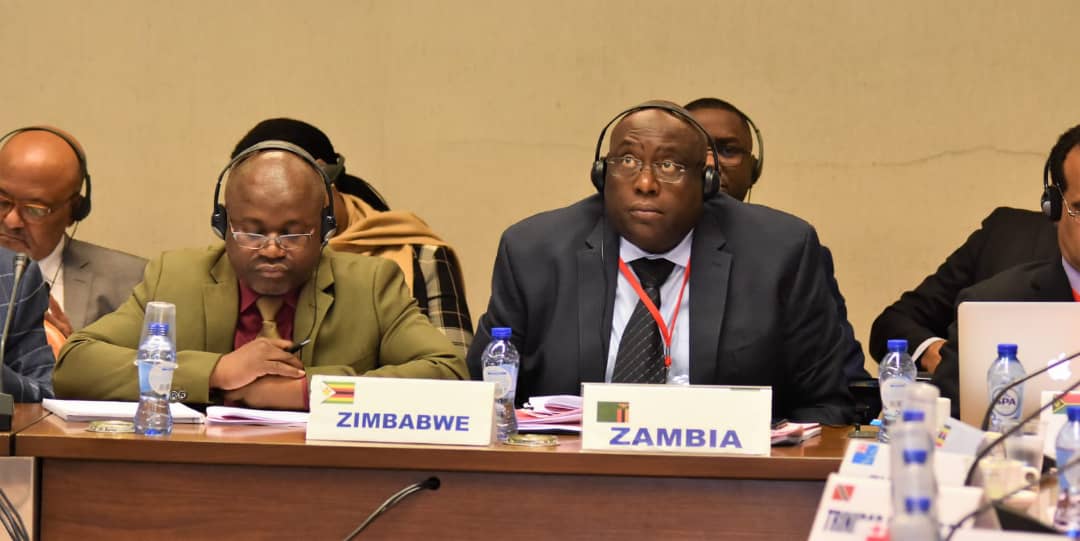The Government says the new Post Cotonou Agreement currently being negotiated between the European Union -EU- and countries of the African, Caribbean and Pacific group -ACP- should have a component aimed at addressing issues of Least Developed Countries (LDCs).
Ministry of Finance Permanent Secretary for Budget and Economic Affairs Dr. Emmanuel Pamu said the proposed agreement should also take into account the provisions for non-Economic Partnership Agreement (EPA) signatory countries.
Dr. Pamu made the remarks during the 108th Session of the Council of Ministers of the African, Caribbean and Pacific Group of States (ACP) in Brussels, Belgium where he led a delegation of Government officials on behalf of Minister of Finance Margaret Mwanakatwe.
The two-day meeting brought together Ministers and officials from the 79 ACP countries to deliberate on key development issues as well as institutional matters involving the future of the organisation. This session of the council also included a meeting of the ACP-EU Joint Ministerial Central Negotiating Group.
During the plenary session of the Council which received a report from the Ministerial Central Negotiating Group presented by ACP chief negotiator Prof. Robert Dussey Minister of Foreign Affairs and African Integration of Togo, Dr. Pamu urged the negotiators to make provisions for specific and separate articles for Trade in Services, Sanitary and Phytosanitary (SPS) measures, standardization and certification, Non-Tariff Barriers (NTBs) as well as trade facilitation in order to give the appropriate weight to these critical issues.
He also noted that while emphasis has been placed on Oceans and Marine water resources, a number of LDCs especially those under the Landlocked Developing Countries (LLDC) category have a vast wealth of inland water systems, which also requires attention.
Dr. Pamu said it is important for interventions on the blue economy to be all-inclusive so that all LDCs, both coastal and inland states, can benefit equally.
On Development Cooperation, Dr. Pamu supported the position taken by the ACP for the retention of the European Development Fund (EDF) and its Regional, National and Intra ACP dimensions, adding that any alternative financing mechanism to be put in place in the Post Cotonou Agreement should retain these important elements.
Zambia is a beneficiary of EU support under the European Development Fund within the framework of the ACP-EU Cotonou Partnership Agreement. Under the 11th European Development Fund (EDF) 2014-2020, Zambia’s National Indicative Programme (NIP) focuses support to three sectors namely, energy, agriculture, and governance aligned to the Government’s priorities.
Dr. Pamu was accompanied at the meeting by Charge d’Affairs at the Zambia Embassy in Belgium Mr. Henry Ngilazi, Director Economic Management, Mrs. Ireen Habasimbi, Principal Economist, Ms. Lenganji Phiri, and Economist, Ms. Kasonde Makumba. Others are Mr. Musenge Mukuma, First Secretary Economic and Mrs. Bwalya Zulu, First Secretary Trade.
At the close of the 108th Session of the ACP Council of Ministers, an information session was organised to allow the two chief negotiators, Professor Dussey for the ACP and Mr. Niven Mimica Commissioner for International Cooperation and Development for the EU, to provide an update on progress made in the negotiations and the way forward.
The chief negotiators lauded the technical team for achieving broad convergence on the structure of the future agreement and the strategic priorities during the first round of talks.
They acknowledged the load of work ahead and the need to intensify efforts in view of the ambitious target to conclude negotiations by summer of 2019.
The Cotonou Agreement is a comprehensive agreement between developing countries and the EU signed in 2000 and will expire in 2020.
The second round of technical negotiations is expected to take place over a three-month period during which the two sides will start drafting the new agreement around agreed priorities.
It is envisaged that the two sides shall commence exploratory talks on regional specificities in March 2019, which will inform the negotiation of EU-Africa, EU-Caribbean and EU-Pacific regional protocols, all legally binding and within the framework of the foundation agreement.
This is contained in a statement issued to Money FM News by Zambia’s Embassy in Brussels, Belgium.
___________________________________________________________________________________
MONEY FM IS ZAMBIA’S FIRST AND ONLY BUSINESS & PERSONAL FINANCE RADIO STATION. WE FOCUS ON BUSINESS AND MONEY-RELATED TOPICS, AS WELL AS GENERAL NEWS AND DISCUSSION OF WIDER SOCIAL TOPICS SUCH AS HEALTH, EDUCATION, FOOD, MUSIC, FITNESS AND MORE.
___________________________________________________________________________________








